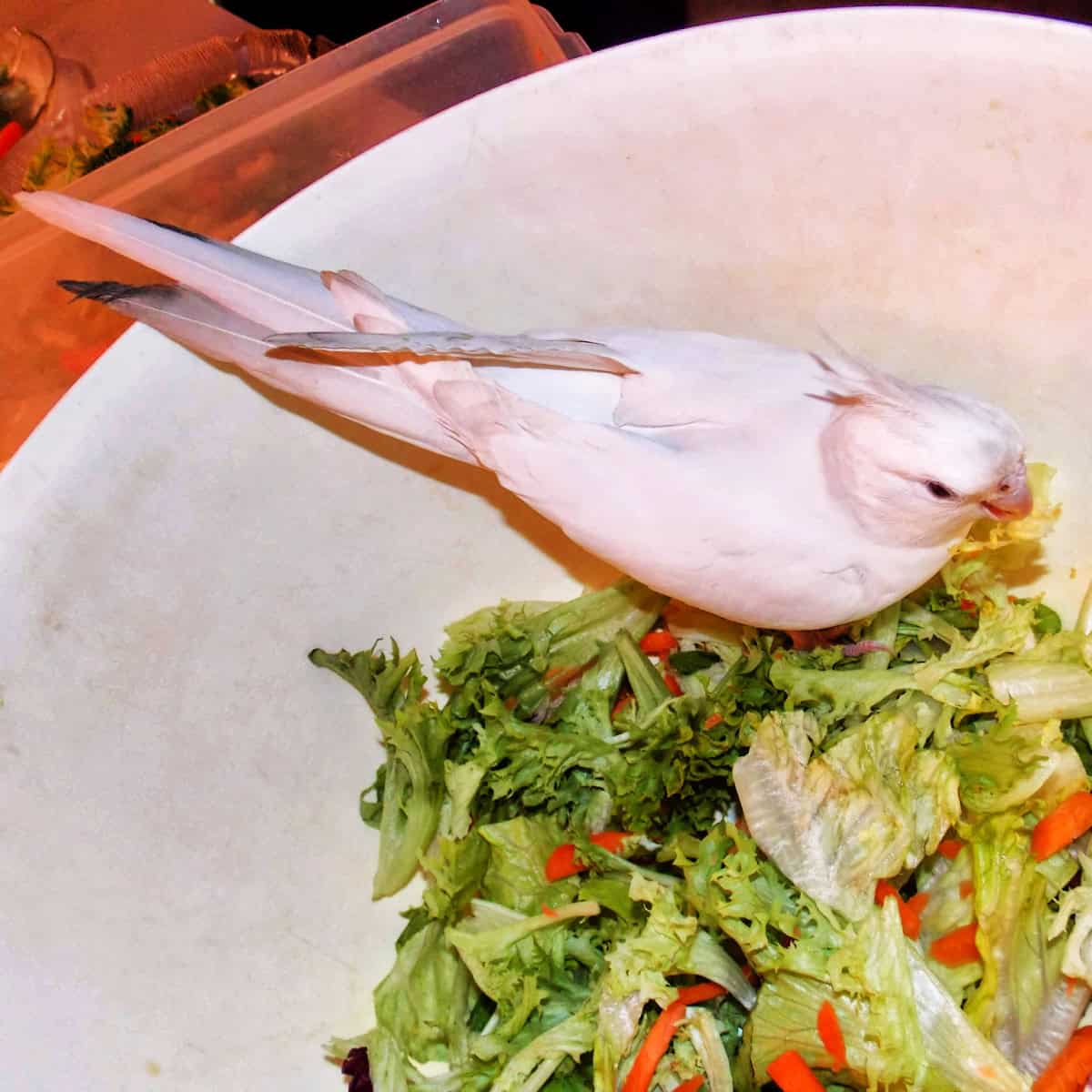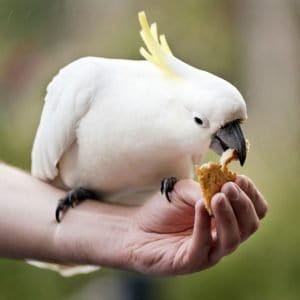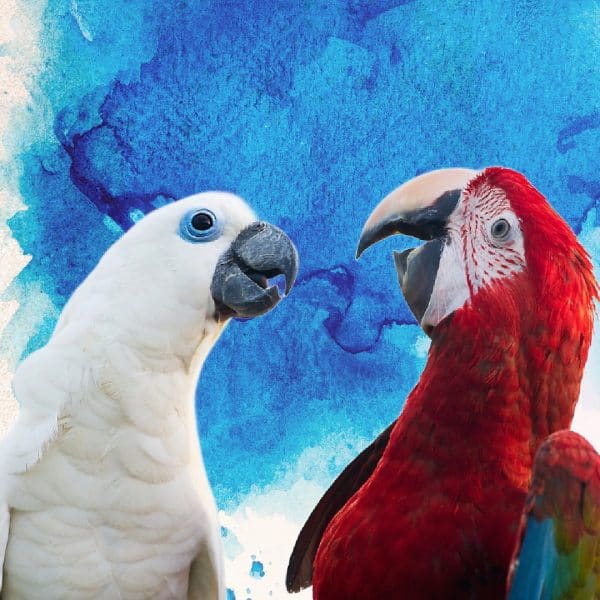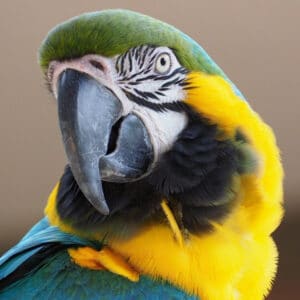Last Updated on by Mitch Rezman
Hello again, Mitch.
I have to confess right here that I never heard of “chop” until I started seeing it in your articles (obviously I’m not feeding it).
I’ve always fed a basic diet of pellets of around 14% protein, with whatever extras of fruits and vegetables that my bird likes, and occasional nuts as treats.
I’ve had my cockatoo for 31 years now; he is 36, and your article reminded me again of a topic that I periodically worry about.
It’s great that you’ve been providing a balanced diet of pellets, fruits, vegetables, and occasional nuts for your cockatoo.
“Chop” is a term that refers to a finely chopped mixture of fresh vegetables, fruits, grains, and sometimes legumes that can be prepared in batches and fed to birds daily.
It offers a way to ensure they get a diverse range of nutrients and keep their meals interesting.
Here’s a brief overview of “chop” and its benefits:
What is Chop?
- Chop is a mixture of various fresh vegetables, fruits, grains, and legumes, finely chopped and mixed together.
- Nutritional Variety: It ensures that birds get a wide variety of nutrients.
- Easy to Prepare: You can make it in bulk and freeze portions to make daily feeding easier.
Basic Ingredients for Chop:
- Vegetables: Kale, spinach, carrots, bell peppers, broccoli, sweet potatoes, etc.
- Fruits: Apples, berries, mango, papaya, etc. (in moderation due to sugar content).
- Grains: Quinoa, brown rice, barley, etc.
- Legumes: Lentils, chickpeas, black beans, etc. (cooked and unsalted).
Benefits of Chop:
- Balanced Nutrition: Provides a range of vitamins, minerals, and antioxidants.
- Variety and Enrichment: This keeps your bird interested in their food and provides enrichment.
- Portion Control: Easier to manage portion sizes and reduce food waste.
How to Introduce Chop:
- Gradual Introduction: Start by mixing a small amount of chop with their regular food.
- Consistency: Offer chop regularly to help your bird get accustomed to it.
- Observation: Monitor which ingredients your bird prefers and adjust the mix accordingly.
Your Current Diet:
Your current feeding regimen of pellets with fruits, vegetables, and nuts is solid.
- Introducing chop can enhance your bird’s diet, providing additional nutrients and variety. It’s also a good way to use up fresh produce and ensure your bird gets a well-rounded diet.
If you have any questions about specific recipes or how to transition to including chop in your bird’s diet, feel free to ask!
Next issue
I am twice as old as my cockatoo, and I think it’s pretty sure that he will outlive me. As I get older, I am worrying more and more about what will happen to him when I die. I want to say up front that as far as Moluccan cockatoos go, he is very “quiet”.
He only makes noise regularly at bedtime and is nowhere near as noisy as most conures and Umbrella cockatoos I have been around.
HOWEVER, and it’s a very big, however, “quiet” from a Moluccan is a relative thing!
It is possible for the actual decibel level to reach jet plane levels, if at least it is lower in pitch (and therefore less annoying to me) than conure shrieks.
I had hoped that my nephew would be willing to take him, but most people find both the noise level and the dust control problem unacceptable.
Especially when the dust gets onto the screen of their giant TV, then the poor birds end up banished to a back room, where nobody spends time and they are alone all day, in “solitary”, with nobody stopping by to play with or pet them.
So, my topic is, are there any truly safe sanctuaries for parrots who have outlived their owners? I once found what looked like a really good place out in the Pacific Northwest, but looking into it closely it turned out to be a scam.
I have also seen multiple “rescue” places that are in fact just unscrupulous people making money taking in birds that they claim they will keep for life, and reselling them ASAP.
Are there any legitimate parrot “forever” sanctuaries, even if you have to pay money to get your bird in? There are actually such sanctuaries for elderly horses.
Thank you,
Judy S.
It’s great that you are thinking ahead to ensure the well-being of your Moluccan cockatoo.
Finding a trustworthy sanctuary for your parrot is crucial. Here are some steps and recommendations to help you find a legitimate sanctuary:
Steps to Identify a Legitimate Sanctuary:
- Research Thoroughly: Look for reviews, testimonials, and any reports on the sanctuaries you are considering. Check for any complaints or red flags.
- Visit the Sanctuary: If possible, visit the sanctuary in person to see the conditions and how the birds are treated. This can give you a firsthand impression of their practices.
- Ask Questions: Contact the sanctuary and ask detailed questions about their care practices, staff qualifications, and policies on rehoming birds.
- Check Credentials: Look for sanctuaries that are accredited by reputable organizations such as the Global Federation of Animal Sanctuaries (GFAS).
- Consult Avian Vets: Ask your avian vet for recommendations. They often have contacts and can guide you to reputable sanctuaries.
Take the Windy City Parrot rescue quiz.
Reputable Parrot Sanctuaries:
- The Gabriel Foundation (Colorado): A well-respected parrot sanctuary that offers lifetime care for birds. They have stringent standards for bird care and are accredited by the GFAS.
- The Oasis Sanctuary (Arizona): Another highly regarded sanctuary that provides lifelong care for parrots. They are also GFAS accredited and have a transparent adoption policy.
- Best Friends Animal Society (Utah): Known for their extensive work with all kinds of animals, including parrots. They focus on providing a safe and caring environment for birds.
Considerations for Future Care:
- Legal Arrangements: Consider setting up a trust or including specific instructions in your will regarding the care of your cockatoo. This can ensure that funds are available for their care and that your wishes are legally documented.
- Potential Caretakers: Even if your nephew or other family members are not ideal candidates, there might be friends, fellow bird enthusiasts, or local bird clubs that can provide a good home.
By taking these steps and exploring these options, you can ensure that your cockatoo will have a safe and loving home in the future. If you need any more specific information or assistance in contacting these sanctuaries, feel free to ask.
Written & Approved by Mitch Rezman and the Windy City Parrot Content team.
Author Profile
Latest entries
 Feeding Exotic BirdsDecember 29, 2025How to Switch or Convert Your Bird From Seeds to Pellets: Real-Life Case Studies and Practical Guidance
Feeding Exotic BirdsDecember 29, 2025How to Switch or Convert Your Bird From Seeds to Pellets: Real-Life Case Studies and Practical Guidance Feeding Exotic BirdsDecember 16, 2025A Practical, Budget-Smart Guide to Feeding Birds Well
Feeding Exotic BirdsDecember 16, 2025A Practical, Budget-Smart Guide to Feeding Birds Well Bird EnviornmentsDecember 7, 2025Understanding Budgie Cage Bar Orientation: Myths, Realities & Practical Solutions for Vertical-Bar Bird Cages
Bird EnviornmentsDecember 7, 2025Understanding Budgie Cage Bar Orientation: Myths, Realities & Practical Solutions for Vertical-Bar Bird Cages Feeding Exotic BirdsDecember 5, 2025How Dr. T.J. Lafeber Rewrote the Future of Pet Bird Nutrition
Feeding Exotic BirdsDecember 5, 2025How Dr. T.J. Lafeber Rewrote the Future of Pet Bird Nutrition



